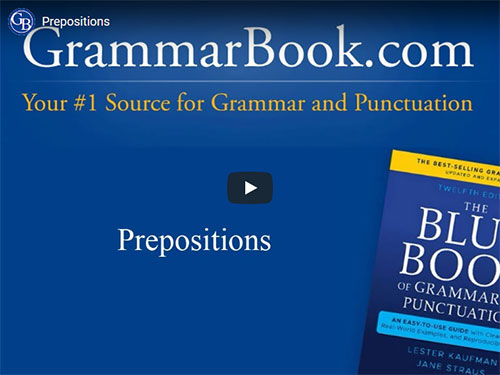|
We recently discussed how nouns can be made into verbs, a practice referred to as verbing: e.g., Why don't you friend me on Facebook?
Within its dynamic fluidity, English also often uses verbs as nouns or turns verbs into them, a process known as nominalization.
Examples
Let's go for a walk.
What an epic fail.
To proceed, we must reach an agreement. |
Through nominalization, rather than describe an action, we make the action a thing.
Why Use Nominalization in English?
We might often use nouns in place of verbs' intentions because the nouns can make a sentence sound more official or abstract. For example, we often see nominalization in medical, legal, scientific, and academic writing, or what might be interpreted as having an institutional voice:
Verb: We studied the survey results.
Nominalization: A study of the survey results was performed. |
Where the first sentence is succinct and direct, the second, while passive and more wordy, creates a distant formality found in institutional writing.
Consider another comparison as we might imagine it spoken:
Verb: What are they asking for?
Nominalization: What is the ask? |
The sentence led by the verb (present progressive) is more immediate and relatable. The sentence that changes the verb to a noun creates a greater sense of separation in what is being expressed.
Rather than be personal in its voice, medical, legal, scientific, and academic writing tends to focus more on the issue or item at hand. For this reason, it can feel more remote and clinical than emotional and subjective. This can at times be useful or proper in writing that addresses sensitive information:
The kidnappers reacted by not releasing the captives.
Not releasing the captives was a reaction by the kidnappers. |
The first, verb-driven sentence is more frank and visceral. By using nominalization instead of a verb, the second sentence, while longer and more passive, helps subdue the information's gravity.
In addition, we might use nominalization as a form of modern parlance, as we see in one of the examples above: What an epic fail. In this context, nominalization is not institutional but rather colloquial.
Nominalization: Ways to Change Verbs to Nouns
We can make nouns out of verbs in several different ways.
1 Add a suffix
Adding a suffix such as -ance, -ence, -ation, -ition, or -ment will change many verbs into a noun.
appear > appearance
refer > reference
cite > citation
ignite > ignition
judge > judgment
We might also add a suffix such as -er or -or to make a verb a noun of agency.
terminate > terminator
teach > teacher
incubate > incubator
Some verbs change their ending to become nouns.
describe > description
decide > decision
proceed > procession
Adding the ending -ing likewise turns many verbs into gerund nouns.
run > Running can be good for you.
eat > Eating too much cake isn't recommended.
hit > The first baseman is improving his hitting. |
2 Locate the verb and adjust the sentence
Find the sentence's verb and determine if it can double as a noun or form into one.
The candidate is running for re-election. (verb)
The candidate announced her run for re-election. (noun)
The first baseman hit the ball. (verb)
The first baseman got a hit. (noun) |
3 Zero Change
Zero-change nominalizations do not need modification: The verb and noun forms are the same. They are more common in informal or conversational writing.
One example is changing the part of speech by adjusting the verb's place in the sentence.
They shop. (main verb)
They purchase in a shop. (object of a preposition)
Shane invited us today. (main verb)
Our invite from Shane arrived today. (main subject)
Angela uses her skills. (main verb)
Angela puts her skills to use. (object of a preposition)
Another example is to simply add a determiner (a, the) before the zero-change verb.
impact > the impact, an impact
show > the show, a show
file > the file, a file |
Avoiding Nominalization Mistakes
As we've alluded to, nominalization can achieve certain ends in communication, such as establishing an institutional or colloquial voice.
However, it can quickly bog down and sap our writing if not used with proper restraint and location. Excess nominalization can turn into pretentious, lifeless, bloated jargon.
| The assessment of the impact of the judgment became a factor in our decision to not send the dignitary an invitation. |
This bureaucratic sentence aims for prowess through nominalization with an official air—either that, or it reflects a willful lack of awareness of when verbs can outperform nouns. Better versions could be:
We factored the judgment when deciding to not invite the dignitary.
Assessing the judgment, we decided to not invite the dignitary.
After assessing the judgment, we decided to not invite the dignitary.
The judgment impacted our decision to not invite the dignitary.
The judgment factored into not inviting the dignitary. |
Reducing the nominalization gives us clearer, shorter sentences.
Now let's look at this one straight from a corporate board room near you:
| It's simple: No ask from them, no reveal from us. We have to know the good faith behind the value-add before they get our buy-in. We're always ready for the pivot to a deliverable in sync with mutual alignment. |
That might sound important, but those listening would probably gain greater insight from something like this:
| It's simple: If they don't ask, we can't reveal. We have to know if it will add value before we agree. We can always pivot to deliver what aligns for us both. |
Another common home for often unneeded nominalization is the sentence with an expletive.
There are many performances you're capable of.
It is our belief that the grass will not grow with that fertilizer. |
Rather than use nominalizations, let's shape those further with verbs:
You can perform in many ways.
We believe the grass will not grow with that fertilizer. |
Watch out also for verbs that convey less-specific actions; they usually need a noun or other descriptive information to help them.
Their reference was to my pilot's license.
They referred to my pilot's license. |
The verb refer is stronger and clearer than the linking verb was, which needs more information to complete its meaning.
Related Topics
Types of Nouns
What Is a Noun Phrase?
Finding Nouns, Verbs, and Subjects
|





